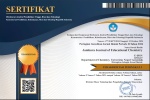Pemahaman Mahasiswa tentang Keberlanjutan dalam Kimia: Kajian Pengembangan pada Proyek Green Chemistry
Abstract
Keywords
Full Text:
PDFReferences
Aftab, J., Abid, N., Cucari, N., & Savastano, M. (2023). Green Human Resource Management And Environmental Performance: The Role Of Green Innovation And Environmental Strategy In A Developing Country. Business Strategy And The Environment, 32(4), 1782-1798. Https://Doi.Org/10.1002/Bse.3219
Ahmar, D. S., Azzajjad, M. F., & Syahrir, Muh. (2020). Students' Representation Ability In Chemistry. Journal Of Applied Science, Engineering, Technology, And Education, 2(2), 181-187. Https://Doi.Org/10.35877/454RI.Asci22124
Ahmar, D. S., Muhammad Fath Azzajjad, & Ahmar, A. S. (2023). The Effect Of Review Video Making On Problem Based Learning To Spatial Ability. JINAV: Journal Of Information And Visualization, 3(2), 104-108. Https://Doi.Org/10.35877/454RI.Jinav1441
Anastas, P. T., & Warner, J. C. (1998). The Twelve Principles Of Green Chemistry. Oxford University Press.
Azizah, N., Muluk, H., & Milla, M. N. (2023). Pursuing Ideological Passion In Islamic Radical Group's Insurgency: A Case Study Of Negara Islam Indonesia. Indonesian Journal Of Islam And Muslim Societies, 13(1), 1-27. Https://Doi.Org/10.18326/Ijims.V13i1.1-27
Bjuland, R., & Mosvold, R. (2015). Lesson Study In Teacher Education: Learning From A Challenging Case. Teaching And Teacher Education, 52, 83-90. Https://Doi.Org/10.1016/J.Tate.2015.09.005
Cadena Triana, L. M., Padilha Lópes, M. C., Guerrero-Martin, L., Montes-Páez, E., & Guerrero-Martin, C. G.-M. (2021). Assessment Of Use Of Concentrated Solar Power Technology For Steam Generation And Subsequent Injection In A Colombian Oil Field: An Application Of Solar EOR. DYNA, 88(217), 220-227. Https://Doi.Org/10.15446/Dyna.V88n217.94330
Chin Mon, C., Dali, M. H., & Chap Sam, L. (2016). Implementation Of Lesson Study As An Innovative Professional Development Model Among Malaysian School Teachers. Malaysian Journal Of Learning And Instruction, Vol. 13, No. 1 June 2016, 83-111. Https://Doi.Org/10.32890/Mjli2016.13.1.5
Chiu, T. K. F., & Chai, C. (2020). Sustainable Curriculum Planning For Artificial Intelligence Education: A Self-Determination Theory Perspective. Sustainability, 12(14), 5568. Https://Doi.Org/10.3390/Su12145568
Ettinger, A. (2020). What BERT Is Not: Lessons From A New Suite Of Psycholinguistic Diagnostics For Language Models. Transactions Of The Association For Computational Linguistics, 8, 34-48. Https://Doi.Org/10.1162/Tacl_A_00298
Ge, S., Foong, S. Y., Ma, N. L., Liew, R. K., Wan Mahari, W. A., Xia, C., Yek, P. N. Y., Peng, W., Nam, W. L., Lim, X. Y., Liew, C. M., Chong, C. C., Sonne, C., & Lam, S. S. (2020). Vacuum Pyrolysis Incorporating Microwave Heating And Base Mixture Modification: An Integrated Approach To Transform Biowaste Into Eco-Friendly Bioenergy Products. Renewable And Sustainable Energy Reviews, 127, 109871. Https://Doi.Org/10.1016/J.Rser.2020.109871
Huysken, K., Olivey, H., Mcelmurry, K., Gao, M., & Avis, P. (2019). Assessing Collaborative, Project-Based Learning Models In Introductory Science Courses. Journal Of The Scholarship Of Teaching And Learning, 19(1). Https://Doi.Org/10.14434/Josotl.V19i1.26777
Innab, A., Albloushi, M., Alruwaili, M., Alqahtani, N., Alenazi, L., & Alkathiri, A. (2022). The Influence Of Sense Of Community And Satisfaction With E-Learning And Their Impact On Nursing Students' Academic Achievement. The International Review Of Research In Open And Distributed Learning, 23(4), 19-34. Https://Doi.Org/10.19173/Irrodl.V23i4.6436
Kwangmuang, P., Jarutkamolpong, S., Sangboonraung, W., & Daungtod, S. (2021). The Development Of Learning Innovation To Enhance Higher Order Thinking Skills For Students In Thailand Junior High Schools. Heliyon, 7(6), E07309. Https://Doi.Org/10.1016/J.Heliyon.2021.E07309
Lombardi, D., Shipley, T. F., Astronomy Team, Biology Team, Chemistry Team, Engineering Team, Geography Team, Geoscience Team, And Physics Team, Bailey, J. M., Bretones, P. S., Prather, E. E., Ballen, C. J., Knight, J. K., Smith, M. K., Stowe, R. L., Cooper, M. M., Prince, M., Atit, K., Uttal, D. H., Ladue, N. D., Mcneal, P. M., Ryker, K., St. John, K., Van Der Hoeven Kraft, K. J., & Docktor, J. L. (2021). The Curious Construct Of Active Learning. Psychological Science In The Public Interest, 22(1), 8-43. Https://Doi.Org/10.1177/1529100620973974
Marpaung, D. N., Pongkendek, J. J., Azzajjad, M. F., & Sukirno, S. (2021). Analysis Of Student Motivation Using Chemsketch On Hydrocarbon Topic In SMA Negeri 2 Merauke. Journal Of Applied Science, Engineering, Technology, And Education, 3(1), 69-73. Https://Doi.Org/10.35877/454RI.Asci105
Nisar, Q. A., Haider, S., Ali, F., Jamshed, S., Ryu, K., & Gill, S. S. (2021). Green Human Resource Management Practices And Environmental Performance In Malaysian Green Hotels: The Role Of Green Intellectual Capital And Pro-Environmental Behavior. Journal Of Cleaner Production, 311, 127504. Https://Doi.Org/10.1016/J.Jclepro.2021.127504
Orgill, M., York, S., & Mackellar, J. (2019). Introduction To Systems Thinking For The Chemistry Education Community. Journal Of Chemical Education, 96(12), 2720-2729. Https://Doi.Org/10.1021/Acs.Jchemed.9b00169
Sheldon, R. A., & Norton, M. (2020). Green Chemistry And The Plastic Pollution Challenge: Towards A Circular Economy. Green Chemistry, 22(19), 6310-6322. Https://Doi.Org/10.1039/D0GC02630A
Singh, U. G. (2022). Book Review: The Distributed University For Sustainable Higher Education. The International Review Of Research In Open And Distributed Learning, 23(4), 190-192. Https://Doi.Org/10.19173/Irrodl.V23i4.6472
Uwineza, I., Uworwabayeho, A., & Yokoyama, K. (2023). Grade-3 Learners' Performance And Conceptual Understanding Development In Technology-Enhanced Teaching With Interactive Mathematics Software. European Journal Of Educational Research, 12(2), 759-774. Https://Doi.Org/10.12973/Eu-Jer.12.2.759
Visvizi, A., & Lytras, M. (2018). It's Not A Fad: Smart Cities And Smart Villages Research In European And Global Contexts. Sustainability, 10(8), 2727. Https://Doi.Org/10.3390/Su10082727
York, S., Lavi, R., Dori, Y. J., & Orgill, M. (2019). Applications Of Systems Thinking In STEM Education. Journal Of Chemical Education, 96(12), 2742-2751. Https://Doi.Org/10.1021/Acs.Jchemed.9b00261
Zimmerman, J. B., Anastas, P. T., Erythropel, H. C., & Leitner, W. (2020). Designing For A Green Chemistry Future. Science, 367(6476), 397-400. Https://Doi.Org/10.1126/Science.Aay3060
DOI: https://doi.org/10.37905/jjec.v6i1.22386
Refbacks
- There are currently no refbacks.
Editorial Office

|
Department of Chemistry, Universitas Negeri Gorontalo |

|
E-mail: jjec@ung.ac.id |

|
|

|
Jambura Journal of Educational Chemistry (p-ISSN: 2655-7606 | e-ISSN: 2656-6427) by Department of Chemistry Universitas Negeri Gorontalo. This work is licensed under a Creative Commons Attribution 4.0 International License. Powered by Public Knowledge Project OJS |










